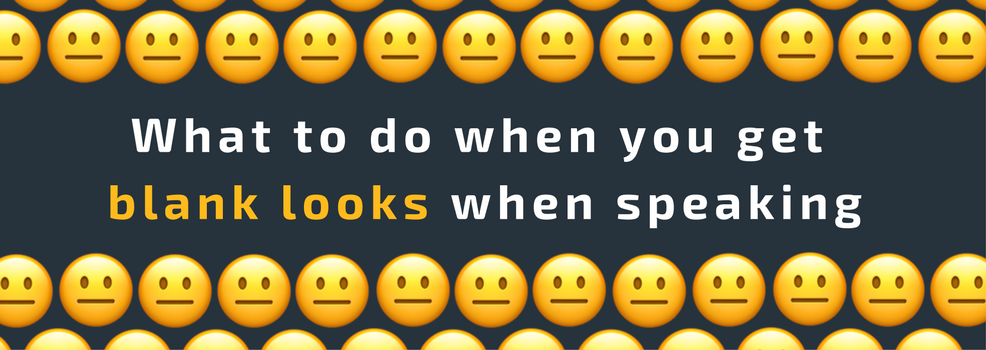Getting blank looks when speaking? Here is what you should do.

I get freaked out when an audience stares blankly at me.
Audiences can look creepy - it’s not all in your head
Don’t take the glacier gazes personally, though, since members of the audience are... just being an “audience”.
They are operating under the principles of audience psychology, obeying certain unspoken rules about how to act and how not to act.
Knowing these rules should help you remain composed.
1. Audiences are cool, not comforting.
In other words, don’t expect pats on the back and scads of smiles when you walk in the door. Curiously, though most people are scared of speaking themselves, they express little sympathy for the poor presenter up there all alone.
So if they seem cold at first, remember that they’d be looking at any other speaker in the same cool way. For the most part you will have to give warmth before you get it.

When an audience is staring blankly at you, the last thing you want to do is stare blankly back.
2. Audiences are responders, not initiators.
They wait for the speaker to set the tone for how they’re supposed to act.
They won’t relax until you act relaxed. They won’t ask questions until you provide the opportunity to ask questions.

Audiences will even sit in a formal, rigid posture until you signal (perhaps by moving away from the podium or leaning forward) that it’s okay to stretch out.
The good news, then, is that you’re in the position to set the standard for the audience behaviour you want.
3. Audiences don’t want to be noticed.
Audiences consist of individuals who don’t want to be singled out. While the speaker worries about poor performance, they have their own concerns.

They may fear introducing themselves (especially standing up and introducing themselves), asking you a stupid question, being called on, or being volunteered for something they don’t know how to do.
Take a look at the first row of seats at your next conference - it often stays empty. Heaven forbid they get too near the speaker!
The audience’s need not to be noticed takes precedence over your need for a little nurturing.
How to counteract blank looks
If you receive more than an occasional blank look when you’re conversing one on one, you’re probably doing something that prevents your message from getting through.
Let’s explore the possibilities.
Your vocabulary or sentence structure may need adjustment if it’s too technical, abstract, or pompous.
For example, many lawyers speak “legalese,” a version of English filled with henceforths, parties of the seventh parth; and clauses tacked on to each other ad infinitum.
Since many listeners won’t let you know when you’re speaking above their heads, it’s up to you to translate for them.
Check in with the listeners occasionally, to make sure you're communicating.
Questions such as “Hands up if you think I’m being clear” and “Let me know if there is anything you’d like me to explain” take responsibility for remedying communication breakdowns.

Another reason for glazed gazes might be that you have little facial animation yourself, and listeners are simply mirroring you.
Research indicates that a speaker who uses various facial expressions is perceived as more engaging and influential.
Mentally observe yourself during conversations to see if you’re giving what you receive.
It’s also possible that your listeners are masking with a frozen face their embarrassment about a mannerism you use while speaking.
Over the years my clients who stutter have told me that when people don’t know how to react, they just stare. Other communication behaviours that produce listener discomfort include too many pauses, peculiar facial expressions or sounds (one client clicked his tongue whenever he was thinking), and frequent mispronunciations.
Gather the courage to ask someone who knows you well if there is anything disconcerting about the way you speak.
About the author
Laurie Schloff is a lifelong corporate communication coach to professionals who uses speaking as a tool for success. Her specialty is designing customized, practical, results oriented and entertaining programs for individuals and groups. She is the author of Smart Speaking, He and She Talk, and Twenty Twinkling Stars, a fundraiser for National Students Against Violence Everywhere.
Interested in becoming a listed public speaker, trainer or moderator on SpeakerHub? Sign up here.


